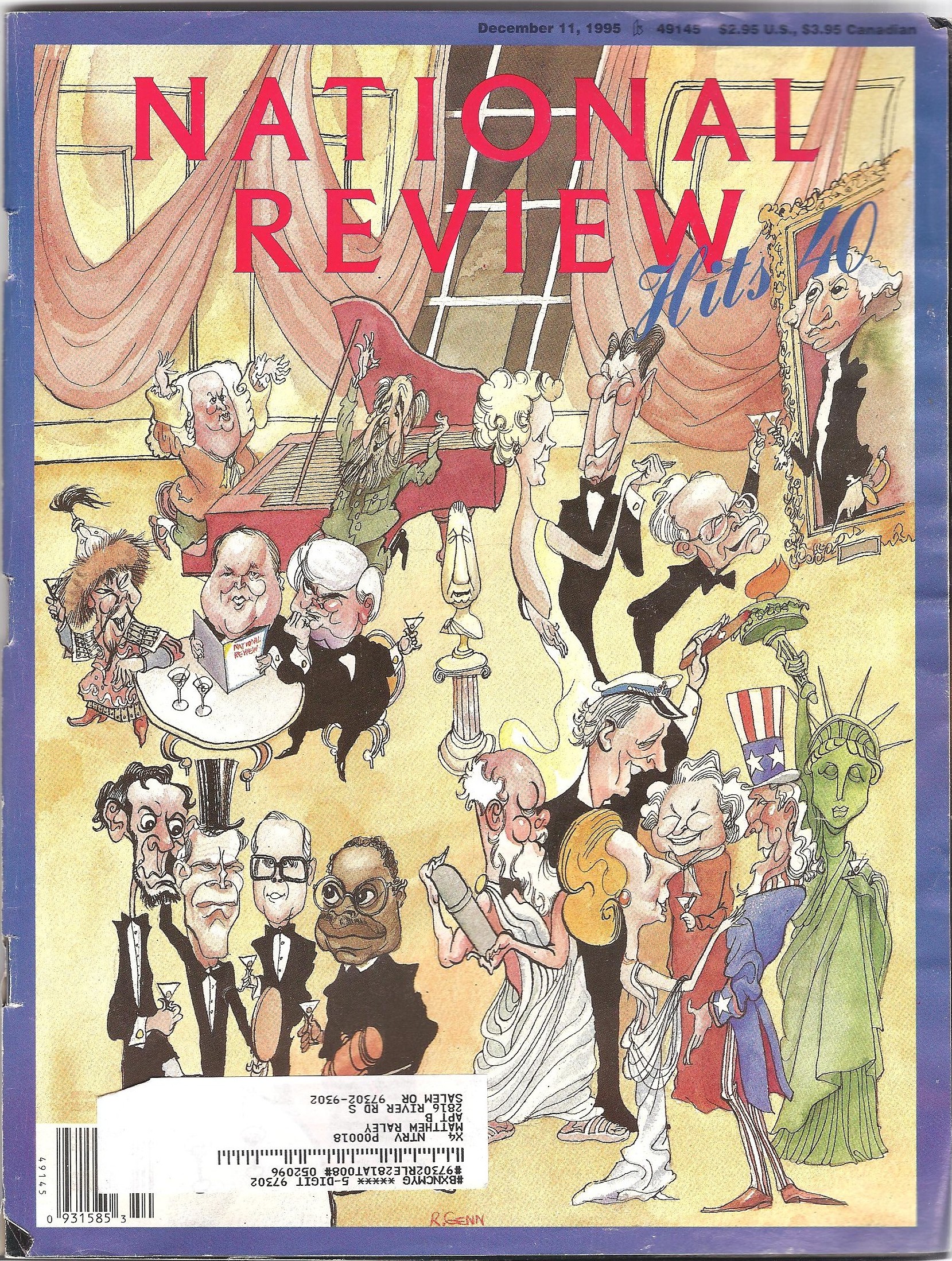by Matthew Raley The generic Congressional polls now predict a Republican thumper in November, recalling the sweep of 1994. When the Republicans took the House and Senate that year, the spread in similar polls had reached 5 points. Today, the RCP average shows a Republican lead of 6.7 points. Last week, the Gallup poll found a record 10-point spread.
Even granting the prudent equivocations -- that two months is a long time in an election cycle, that Republicans have not articulated a clear policy agenda, that the public still does not like them -- it is hard to see how Democrats avoid disaster. Conservative ambitions for radical action are about to balloon.
So I blew the dust off the 40th anniversary issue of National Review, published December 11, 1995, a year into the Republican Congress. Has reality matched conservatives' raised expectations from that time?
What I first noticed thumbing its pages was who had died since publication. William F. Buckley, still going strong then, and Ronald Reagan, who had announced his Alzheimer's disease only a year before. Jack Kemp had not yet been nominated for vice president.
Even long careers are strangely short.
Then I noticed how many debates are still raging: health care, global warming, the federal debt. Next, how drastically media have changed: in one article, Neal Freeman wrote that "Young Media" were talk radio, cable television, and newsletters.
Then, I recalled the subject that had seized conservatives' ambition in the flush of victory: reversing cultural decline.
David Gelernter wrote an essay called, "After Liberalism," the very title of which captures what conservatives dreamed, namely that they were on the verge of delivering a fatal blow to the opposing ideology. But Gelernter was not triumphalist. He ended his essay describing the deteriorating lives of middle class children. Then he observed:
When it comes to family values, Republicans talk a good game and check their children at the door. Values Republicans are eager to show that they are Female-Friendly. Growth Republicans understand clearly that economic disaster would be the consequence were American mothers to walk off the job. We'd all be poorer. Standards of living would drop to what they were in (perhaps) 1965. And so the idea that rearing children and not generating wealth might conceivably be society's first responsibility is orphaned, without a friend anywhere on the mainstream political spectrum.
Spot-on.
In another essay, Digby Anderson wrote of recovering the moral strength of Victorian society, a goal that became a preoccupation of many conservatives in the 1990s. Anderson wrote,
In the mid nineteenth century [the Victorians] inherited a society with significant crime, illegitimacy, and low moral standards. By the end of the century they had substantially reduced crime, halved illegitimacy, and produced a complex, powerful, and sophisticated moral order. . . . Virtue and been lost. Virtue was recovered.
This narrative, backed up by historical and social scientific research from thinkers like Gertrude Himmelfarb and Charles Murray, and amplified among evangelicals by Chuck Colson and others, drove such policies as welfare reform, enacted with Bill Clinton's triangulating signature in 1996. Grabbing congressional majorities fueled a sense that conservatives could restore virtue to the culture by handing power back to ordinary Americans.
Problematic group, those ordinary Americans.
On the one hand, Richard Brookhiser wrote about promising trends among baby-boomers. There was a "revival of religious enthusiasm, amounting to a Fourth Awakening." There was an increase in those who "teach their children around the kitchen table out of McGuffey's Readers." There was also a new interest in virtue itself, signaled by the success of Bill Bennett's The Book of Virtues. Those were indeed striking trends then.
But by the end of the 1990s, pornography and gambling had been culturally mainstreamed, household debt was spiraling, rates of divorce had not significantly changed, and cohabitation outside of marriage was increasing. In 2006, Republican domination of Congress came to an end amid scandals that featured every kind of financial corruption and sexual perversion.
A thumping Republican victory this November will be a significant event. But politicians and their hangers-on are always too quick to believe their press. Political change does not so much alter as reflect culture. The 1994 victory reflected American culture quite accurately, in all its grim corruption.
I turn a page in this old National Review issue and see an ad for Newt Gingrich's book, To Renew America. A fellow pastor loaned me a copy of it in 1997, telling me how much he admired Gingrich's stands, how crucial it was for the moral stamina of the nation to follow his prescriptions. A few weeks later, that pastor was in prison for molesting a minor.
Political power is not enough to renew America. Not even close.

